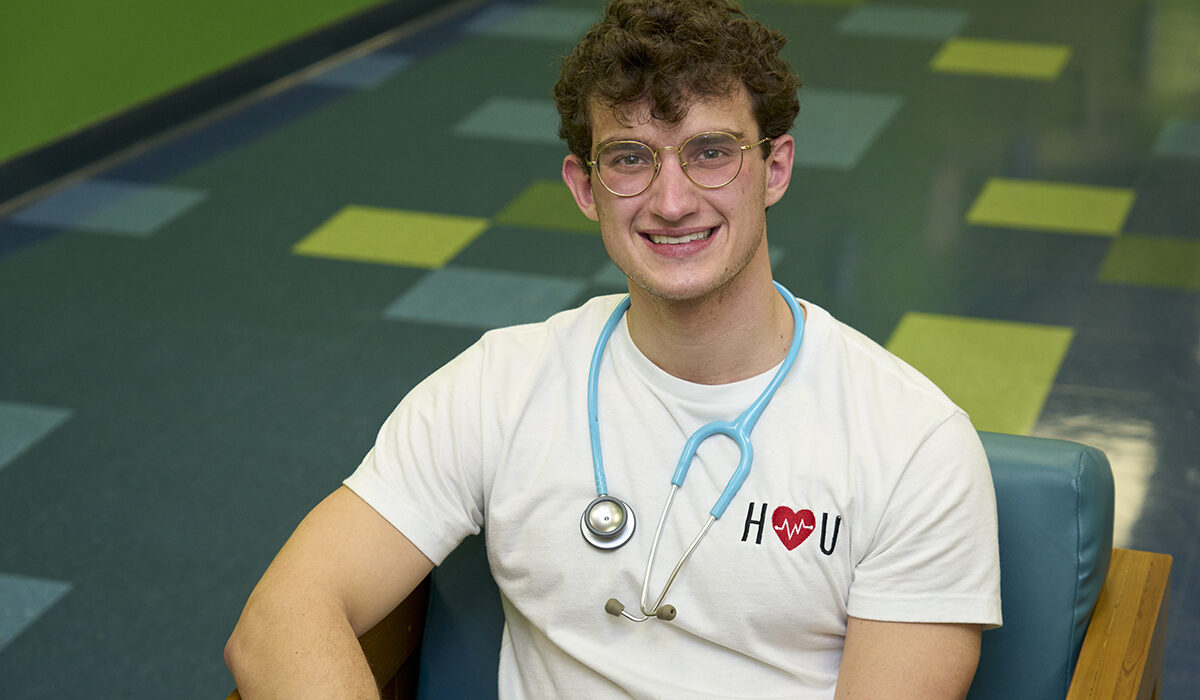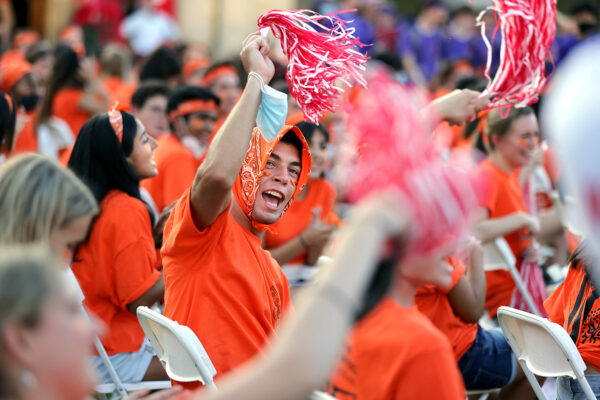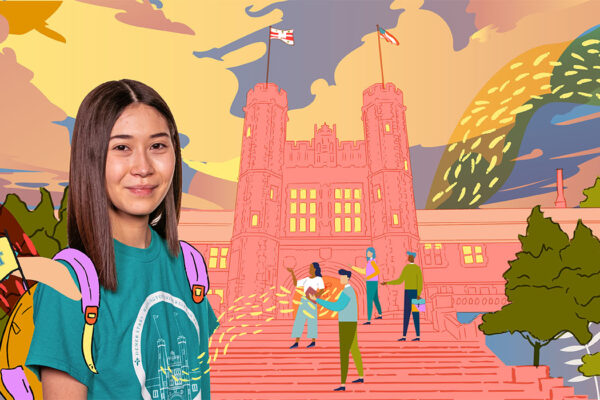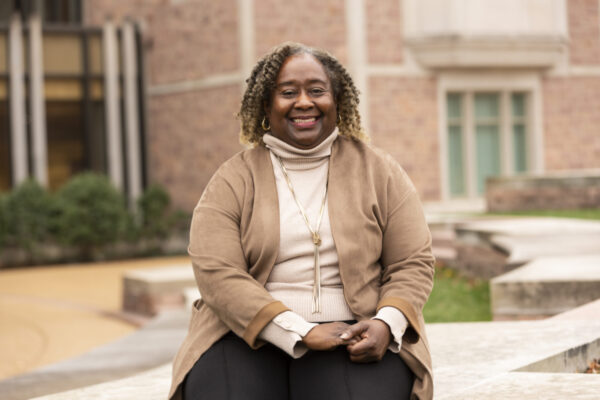Two of Washington University in St. Louis’ largest student groups are led by one very busy junior: John Jachimiak. As co-president of Heart for the Unhoused, Jachimiak travels to shelters across the region to conduct health screenings. And as president of the campus QuestBridge chapter, Jachimiak gives scholars resources, a voice and, most importantly, a community.
The work is all-consuming. When he is not arranging a doctor’s visit for a Heart for the Unhoused patient, he is organizing a dinner for QuestBridge members. And when he is not writing a grant for medical supplies, he is helping a classmate tap into the Student Success Fund to cover an emergency expense.
And around all of those things, he is pursuing his studies in neuroscience in Arts & Sciences or practicing the MCAT in preparation for a career in medicine and public health.
“Honestly, I’m not sure how John does it all, but he is driven by the belief that everyone deserves a champion,” said Theresa Nguyen, a first-year student and QuestBridge scholar. “He really cares about the people on this campus and in the St. Louis community who didn’t get all of the breaks and all of the opportunities.”
People, in other words, like himself.
Jachimiak grew up outside of South Bend, Ind., with two siblings and a mother who worked hard to make ends meet. Still, times were tough, tougher than he realized.
“I didn’t grow up thinking I was especially underprivileged, even though we lived near the poverty line and had our house foreclosed on,” Jachimiak recalled. “As a single mom, my mom did a very good job hiding our situation.”
Power through adversity
An excellent student, Jachimiak believed he could get into a top college. Paying for it would be another question. A random internet search for scholarships turned up the QuestBridge National College Match program, which connects high-achieving, low-income seniors to full four-year scholarships at 48 of the nation’s best colleges and universities. The program is similar to the medical residency system; both students and schools rank their top choices and are paired by their preferences. Jachimiak put WashU high on his list because of its renowned pre-medical program.
“I’ll never forget the day I found out I matched,” Jachimiak said. “My mom wanted to hear before me so she could plan a little celebration. So she filled a box with red and green balloons in the living room and made me guess where I was going. All of our friends and family were there. It was definitely a wonderful time.”
Since joining QuestBridge in 2019, Washington University has enrolled about 190 students who received a match scholarship and more than 100 students who were admitted through the early and regular decision rounds. Next year, 75 match scholars — the largest cohort yet — will join the Class of 2027. They will be welcomed by Jachimiak who, as president, started group dinners and community service opportunities. This semester, students will tutor school children in partnership with the nonprofit organization St. Louis Oasis.
“If you don’t have low-income students sitting at the table, then you’re missing out on something,” Jachimiak said. “The adversity we have faced influences how we think and gives us a different perspective that is important. Those experiences also give us the power and motivation to make a difference in the St. Louis community.”
Nguyen felt far from powerful when she arrived at Washington University. But, with Jachimiak’s encouragement, she has assumed a leadership role on the chapter’s executive board.
“I was a little bit afraid to come to a PWI (predominantly white institution) with a lot of wealthy students,” said Nguyen, who is studying political science in Arts & Sciences. “But John is building a community where we feel really comfortable being open with one another. Whenever anyone is struggling, we can just get on the group chat and there will be someone who has experienced that same thing. John told me, ‘This is a once-in-a-lifetime opportunity. Make the most of it. Explore. And don’t be shy about getting the support you need — and deserve.’ His message to all of us is ‘go for it.’”
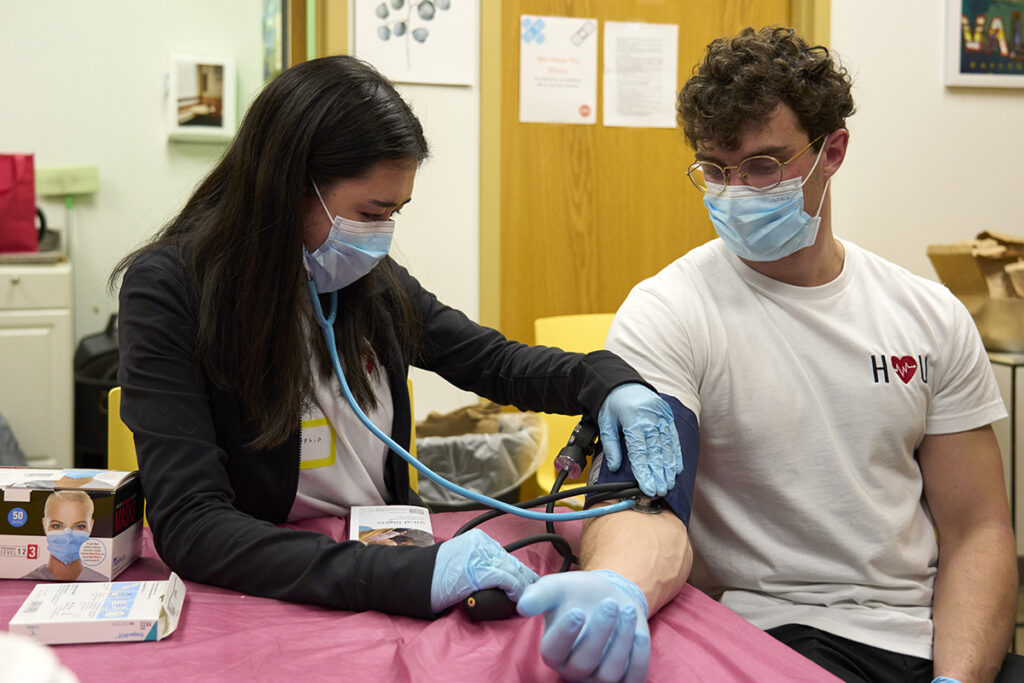
‘This population is me’
Jachimiak is equally committed to helping unhoused St. Louisans get the health care they deserve. On a recent winter night, Jachimiak and a team of Heart for the Unhoused volunteers set up a makeshift health clinic at Covenant House, which serves unhoused youth. The volunteers brought blood pressure cuffs, a portable scale, menstrual supplies, condoms and paper bags stuffed with granola bars and fruit snacks. A teenage girl, one of the 40 young people who lives on site, nervously peeked into the room.
“Come on in,” coaxed Sophia Dutton, Heart for the Unhoused co-president. “You can take whatever you want or just hang out on the couch.”
Another volunteer measured her height, weight and blood pressure, offered a pamphlet that lists free and low-cost health care options and asked if he had any questions about her health. She didn’t, but kept the pamphlet and accepted a bag of food.
“We’re not here to diagnose or treat anyone — we’re not doctors,” Jachimiak said afterward. “But we are here to help people learn about their health and connect them to quality care. And we’re here to listen — what are the obstacles they are facing to get to a doctor or the pharmacy, what are their questions about COVID.”
Founded in 2014, Heart for the Unhoused boasts 90 members, making it the largest student-run nonprofit on campus. In addition to health screenings, the group distributes first aid kits and menstrual products, has created resource guides for a number of U.S. cities and has helped launch campus chapters at Ohio State University, Duke and other universities. New projects include initiatives to collect mental health data at shelters and to develop an app that provides real-time updates about available shelter beds.
For every new project, Heart for the Unhoused rejects many more. Jachimiak and Dutton carefully evaluate initiatives to make sure the organization can deliver on its promises today and in the future.
“It’s really disheartening when you have community partners say, ‘Yeah, we heard from students six years ago who came for a year, and then they just stopped,” Jachimiak said. “It’s not enough to have good intentions; you need a solid infrastructure. That’s why managing growth is so important.”
Stephen Y. Liang, MD, an associate professor at Washington University School of Medicine and the faculty adviser for Heart for the Unhoused, said Jachimiak’s operational acumen matches his medical know-how.
Jachimiak and Dutton have won thousands of dollars in grants, carefully vetted and trained student members and, most importantly, built sustainable partnerships with local nonprofit groups.
“Those of us who work with vulnerable populations worry when we see medical missions or groups with a short-term investment take a helicopter or sightseeing approach to health care. But that’s not the case with Heart for the Unhoused,” Liang said. “John and Sophia may only be here for four years, but by working closely with existing organizations that do the work day in and day out, they are making sure Heart for the Unhoused will remain a long-term presence in the community long after they graduate.”
Nothing could matter more to Jachimiak.
“Our family could have found ourselves in the same situation as some of the people I meet today,” Jachimiak said. “This population is me. I carry that with me every day.”
